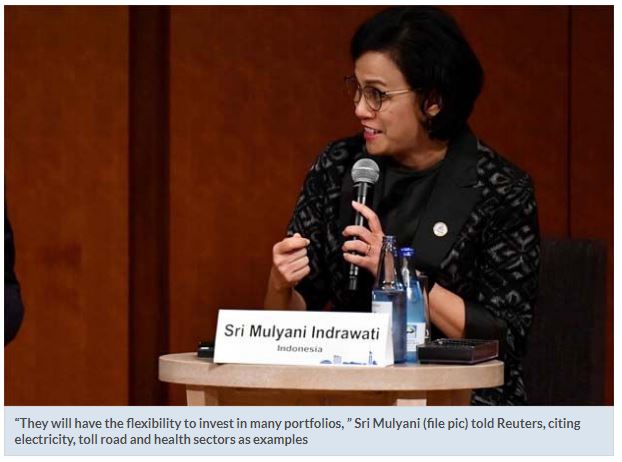Indonesia fund aims to raise US$15bil by offering multiple funds
JAKARTA: Indonesia’s new sovereign wealth fund will offer dedicated industry funds in a bid to drum up US$15bil investment and deepen access to global capital by South-East Asia’s biggest economy, Finance Minister Sri Mulyani Indrawati told Reuters.
The structure, outlined in a briefing by top economic ministers last Friday, has been adopted to entice global investors with various appetites for risk, return and the length of investment.
“They will have the flexibility to invest in many portfolios, ” Sri Mulyani told Reuters, citing electricity, toll road and health sectors as examples. She said the industry-based funds would operate under an over-arching “master fund”, in which investors could also inject money into.
Indonesia’s new fund underpins a target by the world’s fourth most populous country to become a top-five economy in 25 years.
That ambition has been hamstrung in part by Indonesia’s shallow capital markets, which increases reliance on foreign direct investment or, more often, borrowings.
“That’s creating a higher leverage which in the medium- to long-term is not going to be sustainable, ” said Sri Mulyani.
Co-ordinating minister for maritime affairs and investment Luhut Pandjaitan told the briefing the fund “could change Indonesia in the near future, how we run this country”.
Luhut headed to the United States and Japan at the weekend to pitch the fund to private equity firms.
He will also discuss the fund, to be known as the Indonesia Investment Authority, with the World Bank and the International Monetary Fund.
Indonesia’s youthful population, abundant natural resources and proximity to the world’s fastest growing region is attractive to investors but poor infrastructure, red tape and corruption have made some wary.
The government’s new Job Creation Law, of which the fund is part, seeks to address some of those concerns, most notably by harmonising regulations contained in 79 different laws.
Indonesia’s fund seeks to attract investment to finance infrastructure projects and stimulate economic growth, following models adopted by countries including India, Turkey and Malaysia.
But the industrial-scale corruption and massive losses involving Malaysia’s 1MDB fund is an example of what can go wrong if a fund is poorly governed.— Reuters


 Thailand
Thailand




